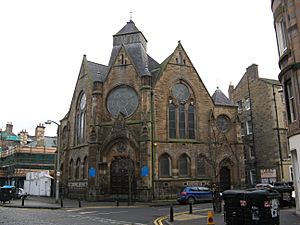St Andrew's Ukrainian Catholic Church facts for kids
Quick facts for kids Our Lady of Pochayiv and St Andrew's Ukrainian Catholic Church |
|
|---|---|
|
Українська католицька церква Св. Андрія
|
|

The Church, seen from Dalmeny Street in Leith
|
|
| 55°57′53″N 3°10′30″W / 55.96472°N 3.17500°W | |
| Location | Leith, Edinburgh |
| Country | Scotland |
| Denomination | Catholic |
| Previous denomination | Presbyterian |
| Tradition | Ukrainian Greek Catholic Church |
| History | |
| Former name(s) | Colston Street U.P. Church, Dalmeny Street U.P. Church, Dalmeny Street U.F. Church |
| Founded | 1965 |
| Dedication | Saint Andrew and Our Lady of Pochayiv |
Our Lady of Pochayiv and St Andrew's Ukrainian Catholic Church (Ukrainian: Українська католицька церква Св. Андрія) is in Leith, Edinburgh, Scotland. It is one of the few Ukrainian Greek Catholic churches in Scotland. This means it is a Catholic church that follows the traditions and rituals of the Ukrainian people. It belongs to the only Eastern Catholic group in Great Britain, which is called the Ukrainian Catholic Eparchy of the Holy Family of London. The church building is also a special listed building because of its history and importance.
The Church's First Years
In March 1879, a group called the United Presbyterian Church decided to build a church here. They wanted to help the many new families moving into the area near Leith Walk. A temporary hall was built that same year. People who already belonged to the church formed a new group there.
In June 1881, George B. Carr became their first minister. The main church building, made of sandstone, opened on October 6, 1882. It was designed in a style called Gothic Revival. Back then, Dalmeny Street was called Colston Street.
In 1900, two church groups joined together. This church then became part of the United Free Church of Scotland. Most of the United Free Church later joined the Church of Scotland in 1929. Dalmeny Street Church followed this change. The church building was empty by 1950. Its members joined another nearby church.
Becoming a Ukrainian Church
After World War II, many Ukrainian people came to England, Scotland, and Wales. These people were part of the Ukrainian diaspora, meaning they had moved away from their home country. Many were refugees who came from camps in West Germany. They arrived as part of a plan to help with work in Britain. In 1950, a newspaper reported that about 1,500 Ukrainians lived in Scotland. Around 700 to 800 of them lived in Edinburgh.
The first Ukrainian Catholic mission in Edinburgh started in 1965. A priest named Mycola Matyczak led this mission. The local Ukrainian community worked hard and gave money to help. They wanted to change the inside of the building into a beautiful Catholic church. They added a large icon (a special religious painting) of Saint Andrew above the main altar.
In 1983, the church was updated and improved. This was done before a big celebration in 1988. That year marked 1,000 years of Catholicism in Ukraine. The updates included a new wooden bell tower and steeple. These were built in an Eastern Catholic style. They also added decorative ironwork around the church. This ironwork includes the tryzub, which is the national symbol of Ukraine. At that time, about 700 people were part of the church community.

